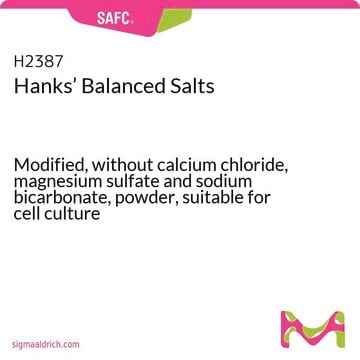E6267
Earle′s Balanced Salts
With sodium bicarbonate, without calcium chloride and magnesium sulfate, liquid, sterile-filtered, suitable for cell culture
Synonym(s):
EBSS
Sign Into View Organizational & Contract Pricing
All Photos(1)
About This Item
Recommended Products
Quality Level
sterility
sterile-filtered
form
liquid
technique(s)
cell culture | mammalian: suitable
impurities
endotoxin, tested
components
NaHCO3: 2.2 g/L
phenol red: 0.011 g/L
glucose: 1.0 g/L (Dextro)
shipped in
ambient
Looking for similar products? Visit Product Comparison Guide
General description
Earle′s Balanced Salts is a balanced salt solution. It is used as an alternative for conventional simulated body fluids (c-SBF).
Recommended for suspension cultures or whenever cell clumping is a problem.
Application
Earle′s Balanced Salts has been used:
- to induce autophagy in mouse embryonic fibroblasts
- in the preparation of melanotroph isolation medium
- in the preparation of DNAse stock solution
Biochem/physiol Actions
Balanced Salt solution participates in providing cells with water, bulk inorganic ions, and nutrients like carbohydrates essential for normal cell metabolism. It acts as an irrigating, transporting, and diluting fluid to maintain cellular osmotic balance. Balance salt solution helps in maintaining the medium within the physiological pH range (7.2 to 7.6).
Storage Class Code
12 - Non Combustible Liquids
WGK
WGK 1
Flash Point(F)
Not applicable
Flash Point(C)
Not applicable
Certificates of Analysis (COA)
Search for Certificates of Analysis (COA) by entering the products Lot/Batch Number. Lot and Batch Numbers can be found on a product’s label following the words ‘Lot’ or ‘Batch’.
Already Own This Product?
Find documentation for the products that you have recently purchased in the Document Library.
Customers Also Viewed
J Bradley Zuchero
Cold Spring Harbor protocols, 2014(8), 826-838 (2014-08-03)
Dorsal root ganglion neurons (DRGs) are sensory neurons that facilitate somatosensation and have been used to study neurite outgrowth, regeneration, and degeneration and PNS and CNS myelination. Studies of DRGs have relied on cell isolation strategies that generally involve extended
Corrosion performance of MAO coatings on AZ31 Mg alloy in simulated body fluid vs. Earle's Balance Salt Solution
Wilke B M, et al.
Applied Surface Science, 363, 328-337 (2016)
Jinyu Wang et al.
The journals of gerontology. Series A, Biological sciences and medical sciences, 73(7), 882-892 (2018-01-19)
Using age of female sexual maturation as a biomarker, we previously identified nuclear receptor interacting protein 1 (Nrip1) as a candidate gene that may regulate aging and longevity. In the current report, we found that the deletion of Nrip1 can
Marisa Granato et al.
Autophagy, 11(11), 1978-1986 (2015-09-24)
This study confirms that autophagy is activated concomitantly with KSHV lytic cycle induction, and that autophagy inhibition by BECN1 knockdown reduces viral lytic gene expression. In addition, we extend previous observations and show that autophagy is blocked at late steps
J Bradley Zuchero
Cold Spring Harbor protocols, 2014(8), 826-838 (2014-08-03)
Dorsal root ganglion neurons (DRGs) are sensory neurons that facilitate somatosensation and have been used to study neurite outgrowth, regeneration, and degeneration and PNS and CNS myelination. Studies of DRGs have relied on cell isolation strategies that generally involve extended
Our team of scientists has experience in all areas of research including Life Science, Material Science, Chemical Synthesis, Chromatography, Analytical and many others.
Contact Technical Service






